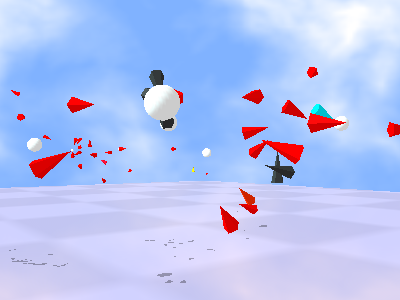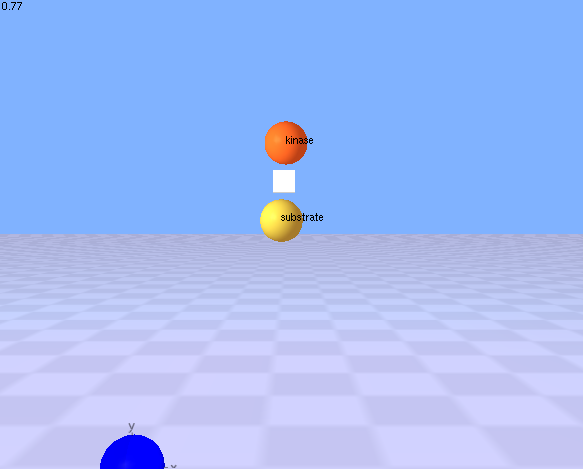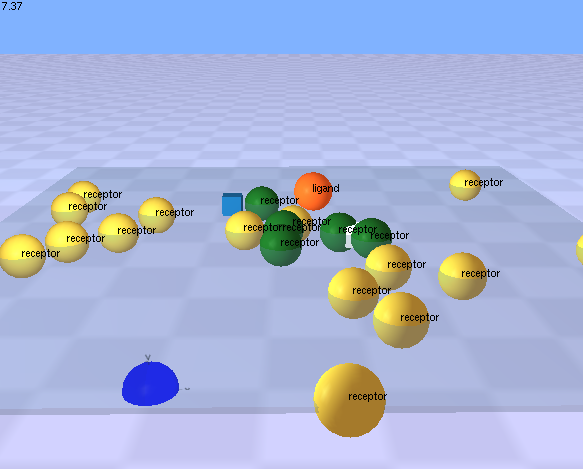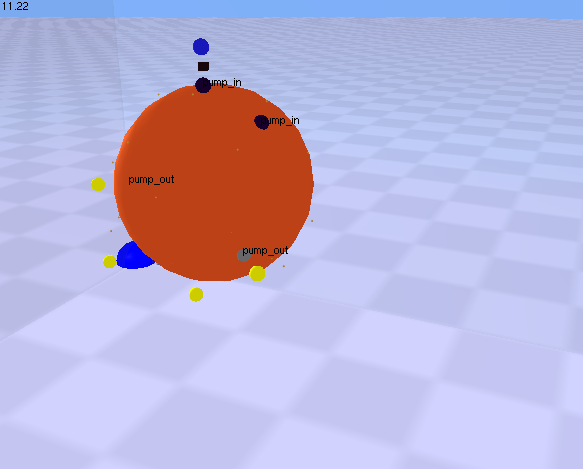Difference between revisions of "Magrathea"
PaulBoddie (talk | contribs) m (→Example movies: Removed the heavy header and footer.) |
|||
| (10 intermediate revisions by one other user not shown) | |||
| Line 1: | Line 1: | ||
| + | [[Image:Magrathea_logo.png|right|Magrathea logo]] | ||
| + | |||
==What is Magrathea?== | ==What is Magrathea?== | ||
Magrathea is a prototype application that demonstrates the use of Coordinated Agent Modeling (CAM). | Magrathea is a prototype application that demonstrates the use of Coordinated Agent Modeling (CAM). | ||
Coordinated Agent Modeling or Context Aware Modelling explores the idea that animation and simulation of molecular pathways belong to the same continuum. The prototype also explores the idea of an abstract concept called a '''coordinator''' to capture the idea of context in molecular pathways. You can read more about Magrathea and CAM in the Magrathea Manual. | Coordinated Agent Modeling or Context Aware Modelling explores the idea that animation and simulation of molecular pathways belong to the same continuum. The prototype also explores the idea of an abstract concept called a '''coordinator''' to capture the idea of context in molecular pathways. You can read more about Magrathea and CAM in the Magrathea Manual. | ||
| − | == | + | |
| + | Click [http://www.biotek.uio.no/research_groups/donaldson_group.html here] to go back to the Donaldson page on the BiO web site. | ||
| + | |||
| + | |||
| + | |||
| + | ==Downloading the magrathea package== | ||
| + | |||
| + | magrathea can be dowloaded via anonymous FTP at | ||
| + | |||
| + | ftp://ftp.no.embnet.org/magrathea | ||
| + | |||
| + | |||
| + | user name: anonymous | ||
| + | |||
| + | password: ftp or your email address | ||
| + | |||
| + | The package includes a tutorial, a manual and everything needed to create your own animations (magrathea and a Windows version of breve). Breve for other operating systems can be downloaded from http://spiderland.org. | ||
| + | |||
| + | The current version of magrathea (1.68) is compatible with breve 2.72. | ||
| + | |||
| + | |||
| + | |||
| + | <!--This is comment | ||
[[The Magrathea Manual: Coordinated Agent Modelling Explained]] | [[The Magrathea Manual: Coordinated Agent Modelling Explained]] | ||
| Line 11: | Line 35: | ||
[[The Magrathea Manual: Building Coordinated Agent Models]] | [[The Magrathea Manual: Building Coordinated Agent Models]] | ||
| + | [[Magrathea Installation and Use]] | ||
| + | |||
| + | [[Example model files for Magrathea]] | ||
| + | |||
| + | --> | ||
| − | |||
==Example movies== | ==Example movies== | ||
| − | Here are some sample movies from the Magrathea project. | + | Here are some sample movies from the Magrathea project. |
| + | |||
| + | Click on the pictures to view the movies. Your web browser requires a plugin (like Quicktime) that is capable of viewing mpeg files. Click the back button in your browser to return here when you are done viewing the movie. | ||
{|class="wikitable" style="text-align:left" border="0" cellpadding="10" | {|class="wikitable" style="text-align:left" border="0" cellpadding="10" | ||
| − | |||
| − | |||
| − | |||
|<imagemap> | |<imagemap> | ||
Image:rules.1.png|200x200px | Image:rules.1.png|200x200px | ||
| Line 28: | Line 55: | ||
This example shows a substrate (molecule 1) that undergoes a state-change (phosphorylation) upon interaction with a kinase (molecule 2). The state change is visualized by a colour change. | This example shows a substrate (molecule 1) that undergoes a state-change (phosphorylation) upon interaction with a kinase (molecule 2). The state change is visualized by a colour change. | ||
| − | |||
|- | |- | ||
|<imagemap> | |<imagemap> | ||
| Line 36: | Line 62: | ||
|| This demonstration shows a somewhat more complex use of rules to demonstrate the process of lateral signalling. | || This demonstration shows a somewhat more complex use of rules to demonstrate the process of lateral signalling. | ||
In this example, a ligand molecule binds to a membrane-bound receptor. On binding, the receptor changes state (becomes activated) as indicated by a colour change. The receptor in this new state also gains the ability to bind to and activate other membrane bound receptors. The overall effect is that a single ligand-receptor binding event initiates a lateral cascade of receptor activation events. | In this example, a ligand molecule binds to a membrane-bound receptor. On binding, the receptor changes state (becomes activated) as indicated by a colour change. The receptor in this new state also gains the ability to bind to and activate other membrane bound receptors. The overall effect is that a single ligand-receptor binding event initiates a lateral cascade of receptor activation events. | ||
| − | |||
| − | |||
|- | |- | ||
|<imagemap> | |<imagemap> | ||
| Line 44: | Line 68: | ||
</imagemap> | </imagemap> | ||
|| This demonstration shows a set of rules that control translocation into and out of a spherical compartment. A number of ligand molecules (blue) bind to a surface receptor (black) on the orange compartment’s surface. The coordinator handling this ligand receptor interaction encodes a rule that translocates the ligand into the orange compartment and changes the state of the ligand such that it is capable of binding to a second receptor (grey) that is also a surface component of the orange compartment. This state change is associated with a colour change for the ligand molecule (blue to yellow). A second coordinator handles the interaction between the ligand and the second receptor and encodes a rule that translocates the ligand out of the orange compartment. Once the ligand is outside the compartment, its state (yellow) prevents it from assembling with the importing receptor (black) for a second time. | || This demonstration shows a set of rules that control translocation into and out of a spherical compartment. A number of ligand molecules (blue) bind to a surface receptor (black) on the orange compartment’s surface. The coordinator handling this ligand receptor interaction encodes a rule that translocates the ligand into the orange compartment and changes the state of the ligand such that it is capable of binding to a second receptor (grey) that is also a surface component of the orange compartment. This state change is associated with a colour change for the ligand molecule (blue to yellow). A second coordinator handles the interaction between the ligand and the second receptor and encodes a rule that translocates the ligand out of the orange compartment. Once the ligand is outside the compartment, its state (yellow) prevents it from assembling with the importing receptor (black) for a second time. | ||
| + | |} | ||
| + | |||
| + | |||
| + | http://groups.google.com/intl/en/images/logos/groups_logo_sm.gif | ||
| + | |||
| + | <b>magrathea-models</b> [http://groups.google.com/group/magrathea-models Visit this group] | ||
| − | + | <b>Subscribe to magrathea-models</b> [http://groups.google.com/group/magrathea-models/subscribe Subscribe] | |
| − | + | ||
| − | + | <!-- | |
| − | + | ==About the name== | |
| − | + | Magrathea is a reference to a [http://en.wikipedia.org/wiki/Places_in_The_Hitchhiker%27s_Guide_to_the_Galaxy#Magrathea fictional planet in Douglas Adam's Hitchhikers Guide to the Galaxy]. Magrathea's economy was based on the manufacturing of other planets. Amongst the clients who asked for planets to be created were a race of hyper-intelligent pan-dimensional beings who asked the Magratheans to create the Earth which, in addition to being a planet, was a super-computer designed to calculate the ultimate question to the ultimate answer to life, the universe, and everything. Amongst the people who worked on it was Slartibartfast, a coastal designer who won an award for his work on Norway. | |
| + | --> | ||
<!-- | <!-- | ||
Latest revision as of 15:09, 24 November 2011
What is Magrathea?
Magrathea is a prototype application that demonstrates the use of Coordinated Agent Modeling (CAM). Coordinated Agent Modeling or Context Aware Modelling explores the idea that animation and simulation of molecular pathways belong to the same continuum. The prototype also explores the idea of an abstract concept called a coordinator to capture the idea of context in molecular pathways. You can read more about Magrathea and CAM in the Magrathea Manual.
Click here to go back to the Donaldson page on the BiO web site.
Downloading the magrathea package
magrathea can be dowloaded via anonymous FTP at
ftp://ftp.no.embnet.org/magrathea
user name: anonymous
password: ftp or your email address
The package includes a tutorial, a manual and everything needed to create your own animations (magrathea and a Windows version of breve). Breve for other operating systems can be downloaded from http://spiderland.org.
The current version of magrathea (1.68) is compatible with breve 2.72.
Example movies
Here are some sample movies from the Magrathea project.
Click on the pictures to view the movies. Your web browser requires a plugin (like Quicktime) that is capable of viewing mpeg files. Click the back button in your browser to return here when you are done viewing the movie.
| This is a simple demonstration of the use of rules by coordinators.
This example shows a substrate (molecule 1) that undergoes a state-change (phosphorylation) upon interaction with a kinase (molecule 2). The state change is visualized by a colour change. | |
| This demonstration shows a somewhat more complex use of rules to demonstrate the process of lateral signalling.
In this example, a ligand molecule binds to a membrane-bound receptor. On binding, the receptor changes state (becomes activated) as indicated by a colour change. The receptor in this new state also gains the ability to bind to and activate other membrane bound receptors. The overall effect is that a single ligand-receptor binding event initiates a lateral cascade of receptor activation events. | |
| This demonstration shows a set of rules that control translocation into and out of a spherical compartment. A number of ligand molecules (blue) bind to a surface receptor (black) on the orange compartment’s surface. The coordinator handling this ligand receptor interaction encodes a rule that translocates the ligand into the orange compartment and changes the state of the ligand such that it is capable of binding to a second receptor (grey) that is also a surface component of the orange compartment. This state change is associated with a colour change for the ligand molecule (blue to yellow). A second coordinator handles the interaction between the ligand and the second receptor and encodes a rule that translocates the ligand out of the orange compartment. Once the ligand is outside the compartment, its state (yellow) prevents it from assembling with the importing receptor (black) for a second time. |

magrathea-models Visit this group
Subscribe to magrathea-models Subscribe




